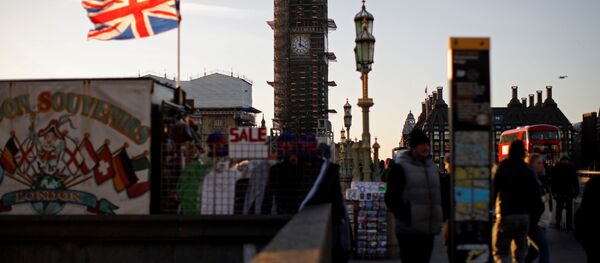Kristian Rouz — A new report by the UK government has found that the nation's GDP growth accelerated to its two-year quickest this past January, defying the murky predictions of a "no-deal" Brexit, and harsh winter weather conditions. The data suggests the British economy could likely extend gains well into this year, despite some caution among investors over possible Brexit-related risks.
Additionally, real disposable salaries and wages also increased due to low unemployment and an overall sustainable labour market. According to a preliminary reading of Purchasing Managers' Indices (PMIs) across the majority of British industries, quarterly growth could come in at 0.1 percent at the beginning of 2019, although most economists expect a 0.3-percent quarterly GDP expansion.
Economists say Brexit remains the main concern for the pace of economic growth in the UK.
"We expect growth to remain subdued until the outcome of Brexit is known", Dan Hanson of Bloomberg Economics wrote. "If a deal is agreed that should spur growth, though it's unlikely the Bank of England will move until it sees evidence of a rebound in the data. We still think the chances of a smooth and orderly Brexit is higher than a disorderly one".
However, some reports suggest a possible "no-deal" hardly poses any credible threat to the British economy — particularly in the wake of the encouraging January report. According to Professor Patrick Minford of the Cardiff Business School, Britain's GDP could expand by £140 billion over the coming 15 years in a "no-deal" scenario.
READ MORE: Debate Over Future of UK Economy Heats Up Ahead of Hammond's Spring Statement
Professor Minford believe a "hard" separation from the EU would bring down the prices on food, clothing, and other consumer goods in the UK by enhancing the nation's flexibility to strike trade deals with non-EU countries. This would spur activity in the services sector, while the solid labour market and rising wages would support effective consumer demand.
"He (Prof. Minford) predicts a boost in GDP by around 7 percent, thanks to reductions in the EU's legendary red tape and the new freedom to strike new trade deals", Richard Mitchell of financial brokerage Rangewell said. "According to the professor, the EU has not only been a drag on the UK economy, but it has also made prices around 8 percent higher than they should be for consumers".
Both Minford and Mitchell say a restoration of the UK's trade relationships with its Commonwealth partners, along with the highly-anticipated free trade deals with the US and Japan, could also boost Britain's financial sector — which, in the meantime, would also maintain its dominant presence in Asia.
As for UK-EU trade, experts say, despite Brussels' threats to slap restrictions on the flow of goods and services across the English Channel, the bloc wouldn't be able to close its market under the World Trade Organisation (WTO) rules.
Hardline British Brexiteers have also pointed to WTO rules as ultimate proof the EU's threats are hardly viable. Jacob Rees-Mogg, a Conservative MP and Chair of the European Research Group, has previously said the "project fear" over a "no-deal" Brexit is hugely exaggerated.
Fears of leaving on WTO terms are hugely exaggerated and are done so for political purposes by those who never wanted us to leave the EU. The world will not end. #CleanBrexit pic.twitter.com/ldkLEq1gvg
— Jacob Rees-Mogg (@Jacob_Rees_Mogg) January 15, 2019
However, Rees-Mogg has since stated he is more inclined to favour striking a Brexit deal with the EU, but only if the agreement comes on the terms acceptable for the UK, and in line with the results of the 2016 Brexit referendum.
Meanwhile, the ONS also said the British economy rose 1.3 percent over the past three months year-on-year — the weakest in five years, not least due to the snap contraction in December.
Rangewell's Mitchell also said a recession — lasting for more than two consecutive quarters — is unlikely regardless of how Brexit plays out. He pointed to the recent improvements in the UK's exports and governmental finances — something unseen for over a decade.
"Indeed the economy has grown and now, due to the large Brexit de-valuation, is experiencing a healthy rebalancing towards net exports", Mitchell said. "By this time last year, the UK was running a current budget surplus for the first time since 2001".
However, investment activity remains subdued, while the financial sector and many non-financial private-sector companies are in a wait-and-see mode — whether the UK will crash out of the EU on 29 March, or the Brexit deadline will be extended until 30 June.




